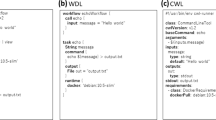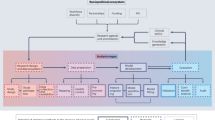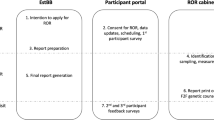Abstract
Advances in genomic technology make possible the large-scale collection of genomic data for research purposes. Many international initiatives seek to collect genomic data on large populations, often relying on existing collections to populate their databases. As these efforts progress, the debate over whether or not to return individual genetic research results to study participants remains an area of much contention. Some recommend returning results to participants only if the issue was addressed in the original study consent form. Much of the data being used in current studies, however, may have been derived from biospecimens collected years ago with consent documents that did not anticipate the possibility of returning individual level genomic results. We conducted an analysis of informed consent documents from published genome-wide association studies (GWAS) (n=40) to explore whether future research use of biospecimens or data is anticipated, and if return of results is addressed and how it is described to better understand participants’ expectations for future disclosure. The majority (70%) of the GWAS consent documents we analyzed either stated explicitly that individual genomic results would not be returned or were silent on the issue. This has implications for how researchers and members of Research Ethics Committees manage the return of results from sequencing studies using legacy samples and data.
Similar content being viewed by others
Log in or create a free account to read this content
Gain free access to this article, as well as selected content from this journal and more on nature.com
or
References
Fernandez C : Public expectations for return of results--time to stop being paternalistic? Am J Bioeth 2008; 8: 46–48.
Fernandez CV, Kodish E, Weijer C : Informing study participants of research results: an ethical imperative. IRB 2003; 25: 12–19.
Shalowitz DI, Miller FG : Disclosing individual results of clinical research: implications of respect for participants. JAMA 2005; 294: 737–740.
Sharp RR, Foster MW : Clinical utility and full disclosure of genetic results to research participants. Am J Bioeth 2006; 6: 42–44.
Clayton EW, Ross LF : Implications of disclosing individual results of clinical research. JAMA 2006; 295: 37.
Meltzer LA : Undesirable implications of disclosing individual genetic results to research participants. Am J Bioeth 2006; 6: 28–30.
Miller FA, Christensen R, Giacomini M, Robert JS : Duty to disclose what? Querying the putative obligation to return research results to participants. J Med Ethics 2008; 34: 210–213.
Clayton EW, McGuire AL : The legal risks of returning results of genomics research. Genet Med 2012; 14: 473–477.
Kaufman D, Murphy J, Scott J, Hudson K : Subjects matter: a survey of public opinions about a large genetic cohort study. Genet Med 2008; 10: 831–839.
Murphy J, Scott J, Kaufman D, Geller G, LeRoy L, Hudson K : Public expectations for return of results from large-cohort genetic research. Am J Bioeth 2008; 8: 36–43.
Shalowitz DI, Miller FG : The search for clarity in communicating research results to study participants. J Med Ethics 2008; 34: e17.
Wendler D, Emanuel E : The debate over research on stored biological samples: what do sources think? Arch Intern Med 2002; 162: 1457–1462.
Bollinger JM, Scott J, Dvoskin R, Kaufman D : Public preferences regarding the return of individual genetic research results: findings from a qualitative focus group study. Genet Med 2012; 14: 451–457.
Beskow LM, O'Rourke PP : Return of genetic research results to participants and families: IRB perspectives and roles. J Law Med Ethics 2015; 43: 502–513.
Gliwa C, Yurkiewicz IR, Lehmann LS, Hull SC, Jones N, Berkman BE : Institutional review board perspectives on obligations to disclose genetic incidental findings to research participants. Genet Med 2015; e-pub ahead of print 19 November 2015; doi:10.1038/gim.2015.149.
Klitzman R, Appelbaum PS, Fyer A et al: Researchers' views on return of incidental genomic research results: qualitative and quantitative findings. Genet Med 2013; 15: 888–895.
Middleton A, Morley KI, Bragin E et al: Attitudes of nearly 7000 health professionals, genomic researchers and publics toward the return of incidental results from sequencing research. Eur J Hum Genet 2016; 24: 21–29.
Bookman EB, Langehorne AA, Eckfeldt JH et al: Reporting genetic results in research studies: summary and recommendations of an NHLBI working group. Am J Med Genet A 2006; 140: 1033–1040.
Fabsitz RR, McGuire A, Sharp RR et al: Ethical and practical guidelines for reporting genetic research results to study participants: updated guidelines from a National Heart, Lung, and Blood Institute working group. Circ Cardiovasc Genet 2010; 3: 574–580.
Knoppers BM, Joly Y, Simard J, Durocher F : The emergence of an ethical duty to disclose genetic research results: international perspectives. Eur J Hum Genet 2006; 14: 1170–1178.
National Bioethics Advisory Commission. Research Involving Human Biological Materials: Ethical Issues and Policy Guidance. Rockville, MD, USA: NBAC, 1999.
Jarvik GP, Amendola LM, Berg JS et al: Return of genomic results to research participants: the floor, the ceiling, and the choices in between. Am J Hum Genet 2014; 94: 818–826.
Green RC, Berg JS, Grody WW et al: ACMG recommendations for reporting of incidental findings in clinical exome and genome sequencing. Genet Med 2013; 15: 565–574.
McGuire AL, Beskow LM : Informed consent in genomics and genetic research. Annu Rev Genomics Hum Genet 2010; 11: 361–381.
Wolf SM, Crock BN, Van Ness B et al: Managing incidental findings and research results in genomic research involving biobanks and archived data sets. Genet Med 2012; 14: 361–384.
Hindorff LA, Junkins HA, Manolio TA : A catalog of published genome-wide association studies, 2013, http://www.genome.gov/26525384 (accessed 22 February 2013).
Ramoni RB, McGuire AL, Robinson JO, Morley DS, Plon SE, Joffe S : Experiences and attitudes of genome investigators regarding return of individual genetic test results. Genet Med 2013; 15: 882–887.
Munung NS, Marshall P, Campbell M et al: Obtaining informed consent for genomics research in Africa: analysis of H3Africa consent documents. J Med Ethics 2016; 42: 132–137.
McGuire AL, Robinson JO, Ramoni RB, Morley DS, Joffe S, Plon SE : Returning genetic research results: study type matters. Per Med 2013; 10: 27–34.
Henderson GE, Wolf SM, Kuczynski KJ et al: The challenge of informed consent and return of results in translational genomics: empirical analysis and recommendations. J Law Med Ethics 2014; 42: 344–355.
Acknowledgements
This work was funded by support from the Baylor College of Medicine Clinical and Translational Research Program and the Baylor Annual Fund. ALM was supported by National Institutes of Health grant R21HG006612. We would like to thank Drs Steven Joffe, Rachel Ramoni, and Sharon Plon for their valuable contributions to this project. In addition, we thank Hayley Peoples for her research assistance on this paper.
Author information
Authors and Affiliations
Corresponding author
Ethics declarations
Competing interests
The authors declare no conflict of interest.
Rights and permissions
About this article
Cite this article
Pereira, S., Oliver Robinson, J. & McGuire, A. Return of individual genomic research results: what do consent forms tell participants?. Eur J Hum Genet 24, 1524–1529 (2016). https://doi.org/10.1038/ejhg.2016.76
Received:
Revised:
Accepted:
Published:
Issue date:
DOI: https://doi.org/10.1038/ejhg.2016.76
This article is cited by
-
The reuse of genetic information in research and informed consent
European Journal of Human Genetics (2023)
-
Perceptions of best practices for return of results in an international survey of psychiatric genetics researchers
European Journal of Human Genetics (2021)
-
How do clinical genetics consent forms address the familial approach to confidentiality and incidental findings? A mixed-methods study
Familial Cancer (2018)



